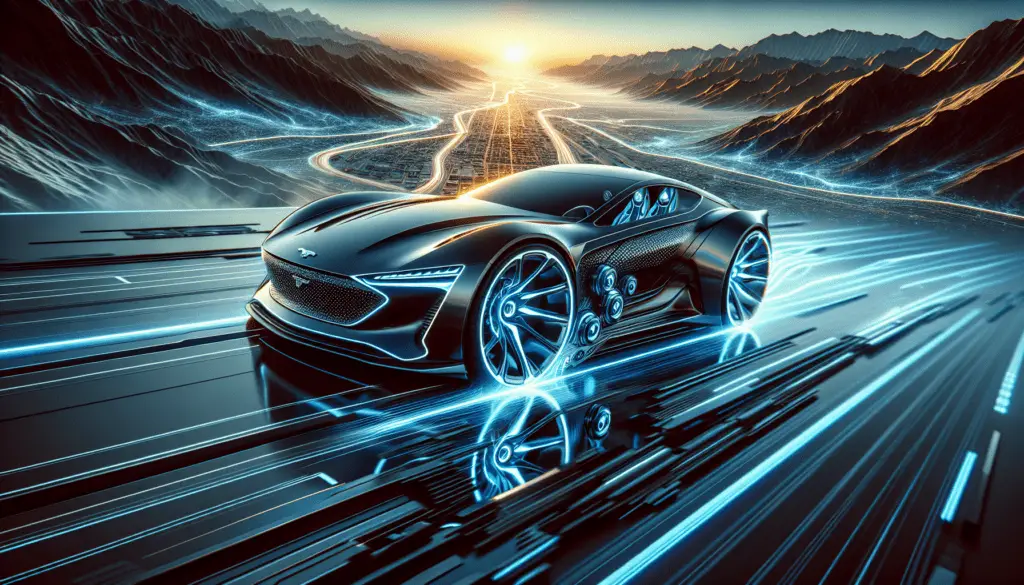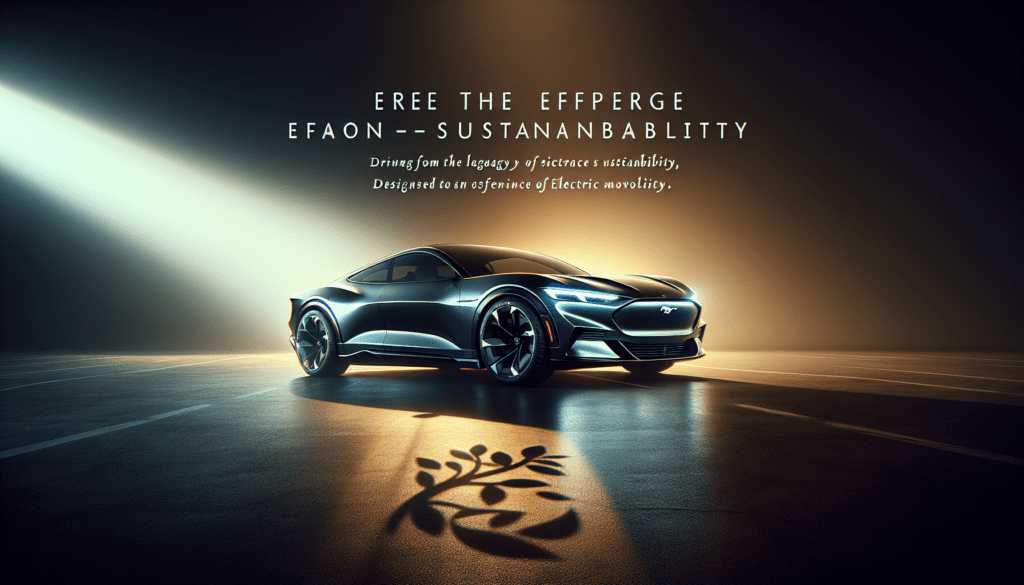Are you curious about Ford electric vehicles but unsure about the facts? In this article, we’ll debunk some of the most common misconceptions surrounding Ford electric vehicles. From concerns about range anxiety to misconceptions about charging infrastructure, we’ll address all the doubts and provide you with accurate information. So, if you’ve been hesitant about making the switch to an electric vehicle, let’s separate fact from fiction and explore the truth about Ford electric vehicles together.
Misconception 1: Limited Range
The belief that Ford electric vehicles have a limited driving range
One common misconception about Ford electric vehicles is that they have a limited driving range. Many people believe that electric vehicles can only travel short distances before needing to be recharged. However, this is not the reality when it comes to Ford electric vehicles.
The reality of Ford electric vehicles’ range capabilities
Ford electric vehicles actually have impressive range capabilities. The latest models, such as the Ford Mustang Mach-E and the Ford F-150 Lightning, offer ranges that can rival or even surpass those of traditional gasoline-powered vehicles. For example, the Mustang Mach-E has a range of up to 300 miles on a single charge, while the F-150 Lightning offers a range of up to 300 miles for the standard range battery and up to 500 miles for the extended range battery. These ranges make Ford electric vehicles suitable for everyday commuting as well as longer trips.
Factors that can affect the range of Ford electric vehicles
It’s important to note that the actual range of a Ford electric vehicle can be influenced by various factors. The range can be affected by driving conditions, such as high speeds or hilly terrain, as well as external temperature and weather conditions. Using certain features, such as air conditioning or heating, can also impact the range. However, Ford electric vehicles come equipped with advanced technologies to help drivers optimize their range and maximize their driving experience.
Misconception 2: Lack of Charging Infrastructure
The misconception that there is insufficient charging infrastructure for Ford electric vehicles
Another misconception about Ford electric vehicles is the belief that there is insufficient charging infrastructure to support their use. Many people worry that they won’t be able to find charging stations when they need them, leading to anxiety about running out of battery power while on the road.
The growing availability of charging stations
However, the reality is that the availability of charging stations is constantly growing. Charging stations can now be found in various locations, including public parking lots, shopping centers, and even along highways. Many cities and municipalities are also investing in expanding their charging infrastructure to meet the growing demand for electric vehicles. This means that finding a charging station for your Ford electric vehicle is becoming increasingly convenient and accessible.
Ford’s partnership with various charging networks
To further address the concern of charging infrastructure, Ford has established partnerships with various charging networks. These partnerships ensure that Ford electric vehicle owners have access to a wide network of charging stations across the country. Ford also provides a mobile app and website that helps owners locate the nearest charging stations, making it even easier to find a charging spot while on the go.

Misconception 3: Long Charging Times
The misconception that Ford electric vehicles take too long to charge
One misconception that often arises when it comes to electric vehicles, including Ford’s, is the belief that they take too long to charge. Many people assume that recharging an electric vehicle will be a time-consuming process, causing inconvenience and delays.
Different charging options for Ford electric vehicles
The reality is that Ford electric vehicles offer multiple charging options to accommodate different needs and charging time preferences. Charging an electric vehicle can be done using a standard household outlet, which typically takes longer to charge but is convenient for overnight charging. However, Ford electric vehicles also support faster charging options, such as Level 2 charging and DC fast charging, which significantly reduce charging times. With Level 2 charging, you can replenish the battery of your Ford electric vehicle at home or at charging stations in a few hours. DC fast charging, available at select charging stations, can get you back on the road with an 80% charge in as little as 30 minutes.
Fast-charging technologies and their impact on charging times
Furthermore, Ford is continually investing in fast-charging technologies to reduce charging times even further. The upcoming Ford F-150 Lightning, for example, will feature Ford’s innovative Intelligent Backup Power system which will allow owners to use their vehicle as a mobile power source, providing fast charging capabilities to devices and even homes during power outages. These advancements in charging technology demonstrate Ford’s commitment to making electric vehicle ownership as convenient and efficient as possible.
Misconception 4: Expensive Maintenance and Repairs
The belief that maintaining and repairing Ford electric vehicles is costly
One misconception that can deter potential buyers from considering Ford electric vehicles is the belief that their maintenance and repairs are expensive. Some people worry that owning an electric vehicle will result in high costs associated with specialized maintenance and repairs.
The cost savings associated with EV maintenance
Contrary to this misconception, owning a Ford electric vehicle can actually lead to cost savings when it comes to maintenance. Electric vehicles have fewer moving parts compared to traditional gasoline-powered vehicles, resulting in reduced wear and tear and lower maintenance requirements. For example, there is no need for oil changes or transmission fluid replacements in electric vehicles. Additionally, electric vehicles have regenerative braking systems that help prolong the life of brake components. Overall, this translates to potential savings in maintenance costs over the lifetime of the vehicle.
Ford’s warranty and maintenance programs
To further alleviate concerns about maintenance costs, Ford offers warranty and maintenance programs specifically designed for their electric vehicles. These programs provide coverage for certain repairs and regular maintenance services, ensuring that owners can enjoy peace of mind and minimize unexpected expenses. Ford’s commitment to customer satisfaction extends to the entire ownership experience, including maintenance and repairs.

Misconception 5: Limited Model Options
The misconception that Ford offers limited model options for electric vehicles
Some potential buyers may have the misconception that Ford offers limited options when it comes to electric vehicles. They may believe that Ford only has a few models available and may be hesitant to consider an electric vehicle from Ford due to this perception.
The expanding lineup of Ford electric vehicles
In reality, Ford has been actively expanding its lineup of electric vehicles in recent years. Alongside the iconic Mustang Mach-E, Ford has introduced the all-electric Ford F-150 Lightning, combining the capabilities of a beloved truck with the benefits of electrification. These two models alone offer a range of options to suit different needs and preferences. Additionally, Ford has announced plans to introduce more electric models in the future, promising an even wider selection of electric vehicles for consumers to choose from.
Upcoming models and their features
The Ford electric vehicle lineup is set to grow with the upcoming introduction of new models. These future offerings will include electric versions of familiar Ford nameplates, such as the Ford Transit van and the Ford Explorer SUV. These models will bring the benefits of electric power to different vehicle segments, providing further options for customers who are considering electric vehicles. With each new model, Ford aims to meet the diverse needs of its customers while delivering the performance and functionality they expect from the brand.
Misconception 6: Lack of Performance
The misconception that Ford electric vehicles lack performance
Another common misconception about Ford electric vehicles is the belief that they lack performance compared to traditional gasoline-powered vehicles. Some potential buyers may be concerned that electric vehicles won’t provide the same level of power and acceleration that they are accustomed to.
The powerful acceleration and torque of Ford electric vehicles
In reality, Ford electric vehicles offer impressive performance capabilities. Electric motors provide instant torque, delivering quick and powerful acceleration from a standstill. This means that Ford electric vehicles can achieve impressive 0-60 mph times and offer exhilarating driving experiences. For example, the Mustang Mach-E GT Performance Edition can accelerate from 0 to 60 mph in just 3.5 seconds, showcasing the impressive performance potential of electric vehicles.
The benefits of instant torque in electric vehicles
Instant torque not only enhances acceleration but also improves overall driving dynamics. Electric vehicles, including Ford’s, have excellent handling and responsiveness due to the distribution of torque to each wheel. This allows for precise control and a smooth driving experience. With electric vehicles, drivers can enjoy the benefits of instant power and responsive handling, making for an enjoyable and engaging driving experience.

Misconception 7: Environmental Impact of Battery Production
The misconception that the production of electric vehicle batteries is harmful to the environment
One misconception often associated with electric vehicles, including Ford’s, is the belief that the production of their batteries is harmful to the environment. Some people worry that the process of manufacturing electric vehicle batteries contributes to pollution and resource depletion.
Ford’s efforts to reduce the environmental impact of battery production
However, Ford is committed to minimizing the environmental impact of battery production. The company has implemented sustainable practices and technologies in its manufacturing processes to reduce carbon emissions and conserve resources. Ford prioritizes the use of clean energy sources, such as renewable energy, in its battery production facilities. Additionally, Ford is actively exploring ways to increase the recyclability and reuse of battery materials, further reducing the environmental footprint associated with their production.
Sustainable materials used in Ford electric vehicle batteries
Furthermore, Ford is committed to using sustainable materials in the production of electric vehicle batteries. For example, the Mustang Mach-E features a battery pack that incorporates recycled and renewable materials. Ford’s focus on sustainable materials not only helps reduce the environmental impact but also contributes to the overall durability and longevity of their electric vehicles.
Misconception 8: Limited Availability
The belief that Ford electric vehicles are not widely available
Some people may mistakenly believe that Ford electric vehicles are not widely available, leading them to think that purchasing an electric vehicle from Ford may be difficult or limited to certain regions.
Ford’s commitment to increasing electric vehicle production and availability
The reality is that Ford is actively working to increase the production and availability of its electric vehicles. The company has made significant investments in electric vehicle manufacturing, including the conversion of existing facilities to produce electric vehicles. Ford has also announced plans to increase its electric vehicle production capacity, ensuring that more vehicles will be available to customers across different regions.
Global market expansion plans
In addition to increasing production capacity, Ford has plans to expand its electric vehicle offerings to global markets. The company recognizes the growing demand for electric vehicles worldwide and aims to make its electric models available to customers around the globe. This commitment to global market expansion ensures that Ford electric vehicles will become more widely accessible and offer a viable option for customers in various countries.

Misconception 9: Incompatibility with Cold Weather
The misconception that Ford electric vehicles are not suitable for cold weather conditions
One misconception that can arise when it comes to electric vehicles, including Ford’s, is the belief that they are not suitable for cold weather conditions. Some people may worry that the performance and range of electric vehicles may be compromised in low temperatures.
Cold weather performance of Ford electric vehicles
Contrary to this misconception, Ford electric vehicles are designed to perform well in cold weather conditions. They utilize advanced thermal management systems that help regulate the temperature of the battery pack, ensuring optimal performance even in extreme cold. These systems help maintain the battery’s efficiency and protect it during cold weather. Additionally, Ford electric vehicles come equipped with features such as heated seats and steering wheels to enhance driver comfort in cold climates.
Technology and features that enhance driving in cold climates
Furthermore, Ford electric vehicles offer features that enhance driving in cold weather. For example, the Mustang Mach-E features an Intelligent All-Wheel Drive system that provides exceptional traction and stability even on snowy or icy roads. This gives drivers confidence and peace of mind in challenging winter conditions.
Misconception 10: Safety Concerns
The misconception that Ford electric vehicles are less safe than traditional vehicles
One misconception that may discourage potential buyers from considering Ford electric vehicles is the belief that they are less safe than traditional gasoline-powered vehicles. Some people may worry about the safety of electric vehicles and the potential risks associated with their use.
The safety features and advancements in Ford electric vehicles
In reality, Ford prioritizes the safety of its electric vehicles and ensures that they meet rigorous safety standards. Ford electric vehicles come equipped with advanced safety features, including multiple airbags, stability control systems, and advanced driver-assistance systems. These technologies are designed to prevent accidents and protect occupants in the event of a collision.
The rigorous testing and safety standards met by Ford electric vehicles
Ford electric vehicles undergo extensive testing and evaluation to meet industry safety standards. They are subjected to rigorous crash tests and simulations to assess their structural integrity and occupant protection. Additionally, Ford works closely with regulatory agencies and industry organizations to continuously improve the safety of their electric vehicles. These efforts demonstrate Ford’s commitment to providing safe and reliable electric vehicles to their customers.
In conclusion, it’s important to address and dispel common misconceptions about Ford electric vehicles. Understanding the reality of range capabilities, charging infrastructure, maintenance costs, model options, and performance can help potential buyers make informed decisions. Additionally, highlighting the environmental benefits, growing availability, compatibility with different weather conditions, and safety features can further support the case for considering Ford electric vehicles. By providing accurate information and addressing misconceptions with a friendly tone, we can promote a better understanding and appreciation for the benefits of Ford electric vehicles.



